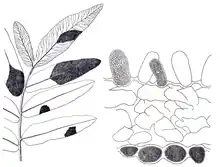| Mixiomycetes | |
|---|---|
 | |
| Scientific classification | |
| Domain: | Eukaryota |
| Kingdom: | Fungi |
| Division: | Basidiomycota |
| Subdivision: | Pucciniomycotina |
| Class: | Mixiomycetes R.Bauer, Begerow, J.P.Samp., M.Weiss & Oberw. (2006)[1] |
| Order: | Mixiales R.Bauer, Begerow, J.P.Samp., M.Weiss & Oberw. (2006)[1] |
| Family: | Mixiaceae C.L.Kramer (1987)[2] |
| Genus: | Mixia C.L.Kramer (1958)[3] |
| Species: | M. osmundae |
| Binomial name | |
| Mixia osmundae (Nishida) C.L.Kramer (1958)[3] | |
The Mixiomycetes are a class of fungi in the Pucciniomycotina subdivision of the Basidiomycota. The class contains a single order, the Mixiales, which in turn contains a single family, the Mixiaceae that circumscribes the monotypic genus Mixia.[4] Only one species has been described to date, Mixia osmundae; this species was originally named Taphrina osmundae by Japanese mycologist Toji Nishida in 1911.[5] It is characterized by having multinucleate hyphae, and by producing multiple spores on sporogenous cells.[1]
The genus name of Mixia is in honour of Arthur Jackson Mix (1888-1956), who was an American mycologist, who worked at the University of Kansas and used to study of the 'Taphrinales'.[6]
The genus was circumscribed by Charles Lawrence Kramer in Mycologia vol.50 (Issue 6) on page 924 in 1958.
References
- 1 2 3 Bauer R, Begerow D, Sampaio JP, Weiss M, Oberwinkler F (2006). "The simple-septate basidiomycetes: a synopsis". Mycological Progress. 5 (1): 41–66. doi:10.1007/s11557-006-0502-0. S2CID 26613287.
- ↑ Kramer CL. (1987). "The Taphrinales". Studies in Mycology. 30: 151–166.
- 1 2 Kramer CL. (1958). "A new genus in the Protomycetaceae". Mycologia. 50 (6): 916–926. doi:10.2307/3755913. JSTOR 3755913.
- ↑ "Mixia C.L.Kramer, 1959". www.gbif.org. Retrieved 6 August 2022.
- ↑ "Mixia osmundae (Nishida) C.L. Kramer 1959". MycoBank. International Mycological Association. Retrieved 2011-11-27.
- ↑ Burkhardt, Lotte (2022). Eine Enzyklopädie zu eponymischen Pflanzennamen [Encyclopedia of eponymic plant names] (pdf) (in German). Berlin: Botanic Garden and Botanical Museum, Freie Universität Berlin. doi:10.3372/epolist2022. ISBN 978-3-946292-41-8. S2CID 246307410. Retrieved January 27, 2022.